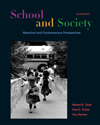 |  School and Society: Historical and Contemporary Perspectives, 4/e Stephen E. Tozer,
The University of Illinois, Chicago
Paul C. Violas
Guy Senese,
Northern Arizona University
Introduction: Understanding School and Society
Professional Vocabulary- Athenian citizenship
- In classical Athens the status granted to Athenian-born males not of the slave or the metic class; a status that granted civil liberties as well as the right to participate in the governance of Athens.
- Athenian slavery
- An institution of bondage and servitude to Athenian citizens that was an important part of the political and economic system on which Athenian democracy was built.
- democracy
- Usually understood as government informed by popular consent rather than by a monarch or an elite group; defined more specifically by Jefferson, Du Bois, and Dewey, among others, who emphasize democracy as a mode of government that educates citizens through participation in decision making (see developmental democracy).
- education through participation
- (see democracy and democratic localism)In government, an emphasis on democracy as a system of government that develops people's capacity for decision making and self-rule while engaging them in processes of democratic decision making; in education, applies to the philosophy of learning by doing.
- ideology
- As used in this book, the constellation of beliefs, values, and habits of thought shared by people in a large or small social group; a society's explanations of and justifications for the prevailing social order or an envisioned ideal order.
- political economy
- According to Webster, " a modern social science dealing with the relationship of political and economic processes"; more generally, a society's institutional arrangements and processes.
- schooling versus education
- A distinction intended to point out that whatever takes place in schools (schooling) may or may not help develop the individual's qualities of mind and body (education).
- social foundations of education
- The cultural contexts within which human learning takes place; the study of those cultural contexts.
- social theory
- Efforts to explain data about humans living together in groups of various kinds; perspectives on human association used to guide the search for information about social groups as well as to explain that information.
- training versus education
- A distinction intended to point out the difference between being prepared for the reliable performance of skills for a particular role (such as in medical training or musical training) and being prepared for a variety of social roles that may require a wide range of knowledge, skills, and critical perspectives (such as a liberal education).
|
|



 2002 McGraw-Hill Higher Education
2002 McGraw-Hill Higher Education